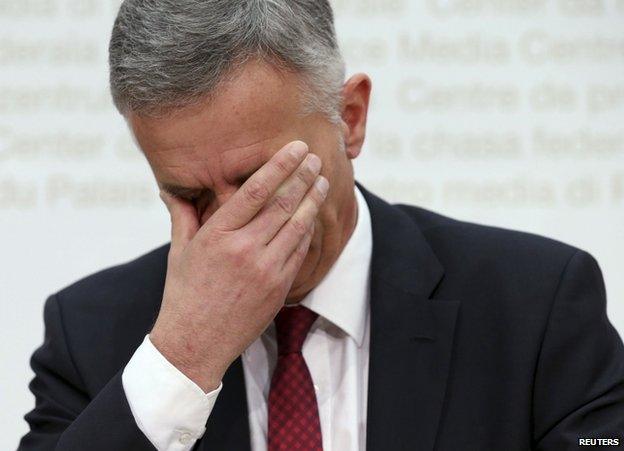Europe elections: Swiss lessons for Brussels
- Published
- comments

Swiss President Didier Burkhalter is seen here at a news conference in Bern after the vote
It is often said that the Swiss are different. They enjoy most of the benefits of the European Union but are not in it. They believe in direct democracy, in consulting the people, in a way that most other European nations would shy away from.
And now the Swiss voters have defied Brussels and their own government. They were warned that the free movement of workers was integral to participating in the EU's single market. Any restrictions would damage relations with the EU. The business community argued that limiting migrants would undermine the economy.
Yet the warnings were not enough. The Swiss narrowly backed a plan to limit immigration. The majority in favour was tiny, a mere 30,000. But it was a majority and the Federal Council announced that it would "without delay begin the work needed to implement the decision of the people".
The arguments heard during the campaign would have been familiar in many European countries.
Those backing limits on migration argued that EU migrants were undercutting Swiss workers. They said the numbers were pushing up rents and putting pressure on the health and education system.
About 80,000 foreigners moved to the country last year. A quarter of Switzerland's population of 8 million are now foreigners. In the end, the vote reflected unease that Switzerland was in danger of losing its identity.
Message to Brussels
So the Swiss have chosen to regain control over migration even though it risks undermining the relationship with Brussels. There will not just be quotas but also restrictions on the right of foreigners to bring in family members and access social services. Businesses must give Swiss nationals priority when hiring staff. There will be a new clause in the constitution stating that migration must serve the nation's economic interest.
Many of the precise details of the quotas have yet to be worked out and the current system will continue in the meantime. But all eyes will be on the reaction from Brussels. As the government in Switzerland admitted, "the new constitution runs contrary to the agreement on the free movement of people". It accepts that its relationship with the EU will have to be put on a new footing.
So far the European Commission has only said that it regrets the vote which "goes against the principle of free movement of persons between the EU and Switzerland". EU-Swiss relations will be re-examined.
For Brussels there are no easy options. Free movement of people is one of its core principles. It sees it as integral to the single market. It has reminded the UK of this and if it embraces a compromise with the Swiss, other countries might chose to follow.
And yet European officials will also be aware that with the European elections pending in May, there will be many anti-establishment parties pushing for the same restrictions as the Swiss voted for. Brussels will believe it has to defend a core principle, yet it will also be aware of how strongly the immigration issue plays with voters.
Nigel Farage of the UKIP was quick to salute the Swiss saying that "it is a great thing to be welcomed that the Swiss people now have the freedom to decide the number and skill level of who they wish to invite to work or stay in their country".
The fact remains that a majority of voters in Switzerland was prepared to risk a major row with its biggest trading partner in order to limit immigration. Other European leaders will take note of that.
- Published20 March 2012